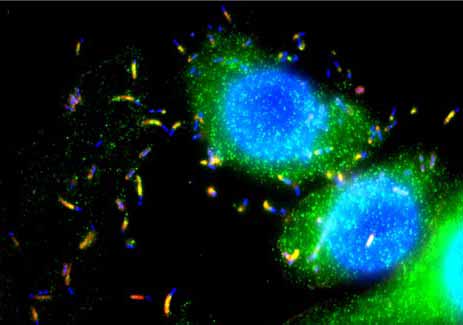Pathogen Engineered to Self-Destruct Underlies Cancer Vaccine Platform
Date: 5.7.2019
A team of investigators has developed a cancer vaccine technology using live, attenuated pathogens as vectors. A feature of the vaccine causes these bacteria to self-destruct once they've done their job, making it safe for use in humans.
 Unlike "prophylactic" vaccines that protect people from the becoming infected with diseases such as measles, influenza, tetanus, or hepatitis, the new vaccine is "therapeutic," that is, designed to treat existing infections or, in this case, prostate and colorectal cancer. It might also be used against hard-to-treat infectious diseases such as malaria or tuberculosis.
Unlike "prophylactic" vaccines that protect people from the becoming infected with diseases such as measles, influenza, tetanus, or hepatitis, the new vaccine is "therapeutic," that is, designed to treat existing infections or, in this case, prostate and colorectal cancer. It might also be used against hard-to-treat infectious diseases such as malaria or tuberculosis.
Using a bacterium in a platform for a vaccination has several benefits, said principal investigator Pete Lauer, PhD, formerly executive director, molecular biology at Aduro Biotech, Berkeley, CA. "Listeria is a little biological factory ... it replicates itself in both the lab and after vaccination. This makes manufacturing as easy as inoculating a culture, and growing it for about a day."
Using a pathogen is useful because it "induces the type of immune response that is required to treat cancer – a CD8 T cell response," said Dr. Lauer. Using a non-pathogen, "we would have had to try to modify the bacterium to be more pathogenic in the right way, which can be really tricky."
The platform, known as "L. monocytogenes recombinase-induced intracellular death," or Lm-RIID for short, is a live recombinant, but highly attenuated (weakened) derivative of the common food-borne pathogen, Listeria monocytogenes. The strain on which Lm-RIID was based showed promise as a therapeutic vaccine in clinical trials in advanced cancer patients as early as 2009. But more safety precautions were needed, because Listeria can be life-threatening in people with weakened immune systems.























